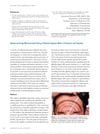 9 citations,
June 2020 in “Actas Dermo-Sifiliográficas”
9 citations,
June 2020 in “Actas Dermo-Sifiliográficas” Spironolactone is effective for acne, hidradenitis suppurativa, female hair loss, and hirsutism but is underused in dermatology.
 20 citations,
August 2019 in “Expert Opinion on Drug Safety”
20 citations,
August 2019 in “Expert Opinion on Drug Safety” Some medications for bladder problems can cause memory issues or mood changes, and doctors should monitor these side effects.
 19 citations,
January 2015 in “Journal of Clinical and Diagnostic Research”
19 citations,
January 2015 in “Journal of Clinical and Diagnostic Research” The main causes of diffuse hair loss in women are telogen effluvium and androgenetic alopecia, often related to stress and iron deficiency.
6 citations,
November 1993 in “European journal of clinical pharmacology” Minoxidil is processed in the body by an enzyme found in the liver and platelets.
 March 1988 in “Journal of The American Academy of Dermatology”
March 1988 in “Journal of The American Academy of Dermatology” The document concludes that misdiagnosis in skin conditions is common, certain treatments can cause allergic reactions, and some skin symptoms are linked to leukemia, especially in certain Japanese regions.
 12 citations,
December 2012 in “Current Drug Targets”
12 citations,
December 2012 in “Current Drug Targets” The Androgen Receptor could be a target for treating diseases like cancer, but more research is needed to confirm the effectiveness of potential treatments.
 May 2024 in “Journal of cosmetic dermatology”
May 2024 in “Journal of cosmetic dermatology” Topical finasteride/minoxidil is effective but not better than oral finasteride for hair loss.
 April 2016 in “Journal of The American Academy of Dermatology”
April 2016 in “Journal of The American Academy of Dermatology” Online medical education helps doctors make better clinical decisions and increases their knowledge in treating fungal nail infections.
 November 2019 in “Клітинна та органна трансплантологія”
November 2019 in “Клітинна та органна трансплантологія” Adipose-derived stem cells are useful in aesthetic medicine and dermatology for improving skin and tissue appearance.
May 2019 in “Journal of clinical oncology” Topical calcitriol was safe and well-tolerated for potential hair loss prevention in chemotherapy patients.
 5 citations,
November 2012 in “The Journal of Urology”
5 citations,
November 2012 in “The Journal of Urology” Early hair loss may indicate future prostate issues.
 January 2019 in “Przegląd Dermatologiczny”
January 2019 in “Przegląd Dermatologiczny” An 87-year-old woman was diagnosed with type 3 autoimmune polyendocrine syndrome and had multiple autoimmune issues.
 14 citations,
March 2022 in “Clinical Endocrinology”
14 citations,
March 2022 in “Clinical Endocrinology” The document concludes that a systematic approach is crucial to identify causes of androgen excess in women beyond the most common cause, Polycystic ovary syndrome (PCOS).
 December 2018 in “Journal of Medicinal and Aromatic Plant Sciences”
December 2018 in “Journal of Medicinal and Aromatic Plant Sciences” Some plants like Eclipta alba, Nardostachys jatamansi, and Rumex japonicus may help hair growth.
 April 2016 in “Journal of The American Academy of Dermatology”
April 2016 in “Journal of The American Academy of Dermatology” People with lichen planopilaris often have seborrheic dermatitis, which can delay the diagnosis of lichen planopilaris.
 3 citations,
August 2023 in “Drug safety”
3 citations,
August 2023 in “Drug safety” Proactive monitoring and management are essential to maximize the benefits of Trastuzumab Deruxtecan while minimizing serious side effects.
 1 citations,
January 2023 in “Cutis”
1 citations,
January 2023 in “Cutis” You might not need to stop cancer treatment if you get a rare skin reaction from EGFR inhibitors, as skin treatments can help manage it.
 July 2015 in “Cambridge University Press eBooks”
July 2015 in “Cambridge University Press eBooks” The document concludes that careful history and physical exams are crucial for accurately diagnosing polycystic ovary syndrome and distinguishing it from other similar conditions.
 April 2016 in “Journal of The American Academy of Dermatology”
April 2016 in “Journal of The American Academy of Dermatology” Using a niacinamide cream can improve life quality for breast cancer patients during chemotherapy.

The document concludes that accurate diagnosis and management of PCOS are crucial due to its associated health risks.
 35 citations,
March 2012 in “Experimental and Clinical Endocrinology & Diabetes”
35 citations,
March 2012 in “Experimental and Clinical Endocrinology & Diabetes” The conclusion is that accurately identifying the cause of high androgen levels in women with PCOS is crucial and requires specific tests.
51 citations,
August 2015 in “Cochrane library” Methotrexate is not proven to maintain remission in ulcerative colitis.
 11 citations,
August 2010 in “Pediatric dermatology”
11 citations,
August 2010 in “Pediatric dermatology” Tacalcitol cream effectively and safely treated a rare skin condition called Lichen Spinulosus in two cases.
 1 citations,
May 2016 in “Dermatologic Surgery”
1 citations,
May 2016 in “Dermatologic Surgery” The document concludes that using a phototrichogram with a protractor and tapeline is a reliable and noninvasive way to measure hair loss.
 July 2018 in “Reactions Weekly”
July 2018 in “Reactions Weekly” Lower finasteride doses had more side effects; dutasteride caused back pain; more research needed on post-finasteride syndrome.
 11 citations,
November 2009 in “Sports Medicine”
11 citations,
November 2009 in “Sports Medicine” Irregular menstrual cycles in exercising women may be linked to energy deficiency or hormonal imbalances, requiring careful diagnosis for proper treatment.
 134 citations,
September 2008 in “Lasers in surgery and medicine”
134 citations,
September 2008 in “Lasers in surgery and medicine” Low fluence photoepilation temporarily removes hair by targeting the hair follicle's pigmented area without severe damage.
20 citations,
June 2020 in “Journal of Advanced Research” High-dose vitamin A and E with zinc improved blood sugar control and insulin function in diabetics, but may cause hair loss.
 October 2022 in “Deleted Journal”
October 2022 in “Deleted Journal” Long-term low-dose Vitamin A intake may cause increased brain pressure.
 8 citations,
May 2017 in “Current traditional medicine”
8 citations,
May 2017 in “Current traditional medicine” Stinging nettle has compounds that help with joint pain, arthritis, and prostate issues.


























